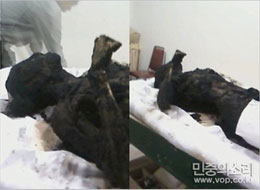
|
|
|
Home Asia Pacific North Asia S/N Korea News & Issues Self-Immolation of Korean monk, Moonsu Sunimby Donggeon Kim, Buddhist Solidarity for the Preservation of Life at the Four Rivers, Republic of Korea, July 7, 2010
Monk's act of self immolation was done in protest of the South Korean government's in pushing ahead with the Four Rivers Restoration Project despite the criticism by the absolute majority of the Korean people Seoul, South Korea -- A Buddhist monk, Ven. Moonsu carried out the offering of himself to the Buddha by burning himself near the bank of the Wicheon stream in Kunwi county, North Kyungsang province, at around 2 pm May 31, 2010.
The Last Will and Testament
The Lee Myung-bak administration must do its best for poor and underprivileged people instead of the rich. Moonsu The 'Wicheon', where Ven. Moonsu immolated himself, is a branch of the Nakdong River, where the Lee administration is pressing ahead with the Four Rivers Restoration Project. It was reported that Ven. Moonsu walked to the Wicheon, about 20 km from Jibosah ('sah' means a temple), where he stayed and practiced asceticism, and he bought gasoline from a gas station and seemed to have set fired to himself. Ven. Moonsu left another note with the same requests above in his room at the Jibosah he stayed, so that it obviously informed people of his will and intention. His action seems to be the result of a long contemplation. According to the report, he had called his brother two months ago and said he might be able to stop the Four Rivers Restoration Project by his sacrifice.
Who Was Ven. Moonsu? Ven. Moonsu was a Bhikkhu (Buddhist monk) of the Korean Buddhist Jogye Order, and he had led a very ascetic life, poor but honest living, following the teachings of the Buddha. He was ordained at Haeinsah in 1986, studied at college for Buddhist monks in Haeinsah in 1988, entered Joong-Ang Sangha University, and was elected the president of the student council, showing his leadership qualities. After graduation, he devoted himself to Buddhist practices at Tongdosah, Dubangsah, Haeinsah, and Myogwanumsah, and other temples. When he stayed at Jibosah, the last temple he stayed before his self-immolation, he had practiced zen in a room-without-doors in the mountains for 3 years. he had a meal once a day and he was rarely seen by the fellow practitioners as well as the Buddhist believers in Jibosah. The fellow monks remember Ven. Moonsu as a model Buddhist practitioner who led a poor but honest life. It is known that he was so unworldly that he didn't have even his own bank account. After he passed away, nothing was found but an old chest of drawers and 3 years' newspapers, piled up at the corner of his room. The articles left by the deceased monk were a pair of Buddhist monk's robes, a pair of rubber shoes, and only 100,000 Won in cash. It’s obvious how strictly he followed the principle of non-possession. Why Did Ven. Moonsu Immolate Himself? Ven. Moonsu was a Buddhist monk. A Buddhist monk has a fundamental precept, that is, "to refrain from taking life", so that he should take care of all the living beings and should not hurt even himself. However, he threw his life away dauntlessly. It was an act of sublime self-sacrifice to protect all living beings from being killed, and to warn against the government's ruthless and indiscriminate reclamation and excavation of the four rivers. Before he passed away, he said to his fellow monks and dhamma friends, "I wish I could stop the Four Rivers Project by throwing myself away..." His wish to save all the living beings led his to offer his own life. He also said, "The Lee Myung-bak administration must do its best for poor and underprivileged people instead of the rich." He had a limitless sympathy to the poor and underprivileged people, whose lives became heavier and more difficult under the Lee administration. He asked the administration to do its best instead of just criticizing, though. He desperately wanted the government to change its policies. His short note is full of mercy for the poor and disadvantaged people as well as the wildlife and its habitat that are being destroyed by the four rivers restoration project. Without mentioning his individual life, he was deeply concerned for all the living beings, not only human beings. This is the heart of a Bodhisattva. The heart of infinite mercy was the only reason of offering his body to the Buddha. Response from Korean Society It was two days before the local elections in Korea when Ven. Moonsu immolated himself. We can't speak conclusively why he chose that day, but considering that one of the crucial issues of the local elections was the four rivers restoration project, it is not difficult to understand his intention to awaken the Korean people to the issue at hand. Nevertheless, most of the conservative press and media didn't even report the Ven. Moonsu's self-immolation. They might have judged that it would function as an unfavorable factor for the ruling party at the election. It was the Korean Buddhist community that was shocked the most. It was because he was, in the history of Korean Buddhism, the first Buddhist monk who offered himself by immolating on account of a social issue. The Buddhist Solidarity for Saving Lives in the Four Rivers, the solidarity organization of Buddhist NGOs which has protested against the Four Rivers Restoration Project, sent a fact-finding group to the spot when they heard the news on May 31. The executive officer of Jogye Order, fellow monks and nuns, and the graduates of Joong-Ang Sangha University and others held a send-off ceremony of Ven. Moonsu at Jibosah on June 4th, and the nationwide funeral ceremony was conducted at Jogyesah in Seoul on June 5th, with about two thousand people from various groups gathering. After the news of Ven. Moonsu's self-immolation, Korean Buddhist organizations set up an incense altar at Jogyesah and have conducted continuing memorial events. 'Prayers for Saving Lives' has been proceeded with no pause, and 'Forum for Life and Peace' has also proceeded every night by invited celebrities and experts to examine the meaning of Ven. Moonsu's self-immolation. There have been cultural festivals for memorial on Saturdays. Other religious leaders also participated in these events. A 'Religious Environment Conference', consisting of the Catholic church, the Protestant church, and Won Buddhism, etc., held the nationwide memorial ceremony last June 5th to pay tribute to the spirit of Ven. Moonsu to save lives by self-sacrifice. At the memorial ceremony about two thousand people came from various areas, leaders of opposition parties, including Democratic Party, leaders of environmental groups and social groups gathered to urge the government to stop the Four Rivers Restoration Project. There was also a memorial ceremony at his hometown, Wanju in Jeollabukdo province, praising his as a righteous person. There happened another sad affair. Ven. Sugyeong, who had devoted himself to protect environment and lives from the indiscriminate reclamation of Jirisahn (Mt.), Saemankum, and Bukhansahn (Mt.) areas, suddenly resigned and left everything behind. He said, "Upon hearing Ven. Moonsu's self-immolation, I have lost conviction to continue my hypocritical life, not solving the matter of life and death." He laid down everything including the priesthood. It was another act of sacrifice to protect lives from being sacrificed. Ven. Moonsu's devotion deeply moved the hearts of a large number of citizens and religious people, but the Lee Myung-bak administration, directly involved, wouldn’t nudge an inch. The government and the parties concerned have largely remained silent over the last will of Ven. Moonsu and didn’t pay any visit to offer condolences. It is regrettable that they rather responded by pursuing the Four Rivers Restoration Project and continuing operations day and night. An appeal to the International Community Jo Haein, a Catholic priest, who is conducting the 'Lives and Peace Movement', said that Ven. Moonsu's self-immolation was not just a suicide, an expression of anger, but a holy self-sacrifice for all living beings. Police officials, who examined the body of Ven. Moonsu, were very surprised to see his face with a smile and his straight posture. We think it is an expression of his obvious and strong wish for saving lives, based on thorough ascetic practice. Nevertheless, the Korean government is disregarding the meaning of his precious will completely. Another opinion, which recommends that the Korean government execute the project partially at a specific river on a trial basis, was also completely ignored. The Korean Buddhist Federation is sincerely requesting all Buddhist organizations, international religious organizations, environmental organizations, and other international organizations, send the messages of solidarity and condolences about Ven. Moonsu, protesting against the attitude of Korean government. The global support and message of solidarity will spread worldwide the sublime meaning of the Ven. Moonsu's sacrifice, and play an important role of urging to suspend the cruel destruction of life by the Korean government. You can send your messages to the following address. General Secretary: Woongki Jung ------------ |
 |
|
| Korean Buddhist News from BTN (Korean Language) |
|
 |
|
|
Please help keep the Buddhist Channel going |
|
| Point
your feed reader to this location |
|

 Furthermore, the Venerable Kyunwol, the great monk of Jibosah, said that he had criticized the government for pushing ahead with the Four Rivers Restoration Project despite the criticism by the absolute majority of the Korean people the day before his offering. After considering all the factors, it’s evident that the Ven. Moonsu didn't want any living beings to be sacrificed any more, he wanted to rebuke the Lee administration for not taking enough care of the powerless common folk, and finally he decided to do something decisive; burning his body so as to enlighten the world.
Furthermore, the Venerable Kyunwol, the great monk of Jibosah, said that he had criticized the government for pushing ahead with the Four Rivers Restoration Project despite the criticism by the absolute majority of the Korean people the day before his offering. After considering all the factors, it’s evident that the Ven. Moonsu didn't want any living beings to be sacrificed any more, he wanted to rebuke the Lee administration for not taking enough care of the powerless common folk, and finally he decided to do something decisive; burning his body so as to enlighten the world.

